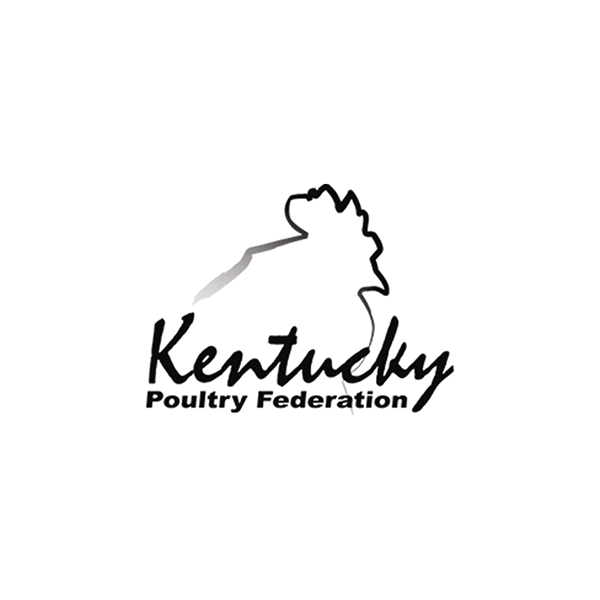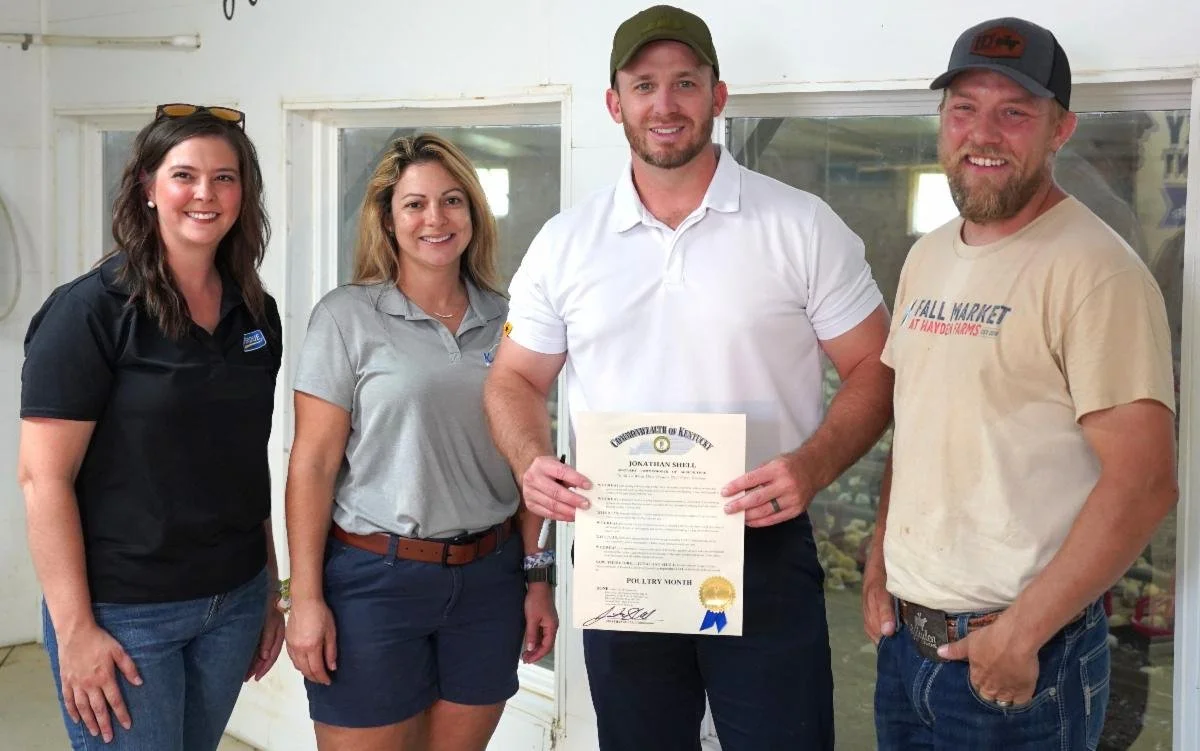Poultry and Eggs
Kentucky's Poultry Industry
About 280 million broilers (meat-type chickens) were raised on Kentucky farms in 2023
Broiler production brought $1.573 billion to Kentucky.
Nearly 5.5 million laying hens produced $256 million in egg sales.
There are 850 large-scale poultry farms in 50 counties.
There are 685 Kentucky turkey farms as of 2022 with cash receipts totaling $30 million.
15.5% of the product being produced is exported, meaning that $108.5 million per year is coming into Kentucky from international trade
7,000 industry employees
Pays out $133.8 million in salaries and wages and over $91 million in grower payments.
30% of the workforce is supervisors, skilled maintenance, professional truck drivers, and quality assurance technicians.
Kentucky's poultry industry uses 29% ($74,709,384) or 35.8 million bushels of Kentucky's corn crop and 32% or 335,000 tons of its soybean crop.
Kentucky's grain farmers realize a 10-15¢ per bushel premium from poultry giving them a $10-$15 million bonus for their grain.
The Kentucky poultry industry has made a large investment in facilities. This investment includes:
5 broiler hatcheries
2 primary breeder hatcheries
6 feed mills
4 processing plants
3 layer complexes
A protein conversion plant
850 poultry farms with 2,800 poultry houses
Source: National Agriculture Statistics Service, 2017 Ag Census, and Economic Research Commission and the University of Kentucky Poultry Science Group.
Poultry: What’s in a Name?
Poultry are a type of birds that we use for meat and eggs. Chickens, turkeys, ducks, and geese are all types of poultry. In Kentucky, we are most familiar with plentiful chickens.
When chickens are just one day old, they move to a temperature-controlled house with other chickens. They get a healthy diet of corn, soybeans, and plenty of water until they are fully grown. Kentucky poultry eat between 25 and 35% of our locally grown corn and soybeans. Chickens convert their feed into high-quality protein, so their meat contains essential amino acids, B vitamins and minerals like iron and zinc.
While any chicken can be raised for meat and all female chickens (hens) lay eggs, certain breeds of chicken are better suited for meat, and others for eggs. We call those chickens Broilers (meat) and Layers (eggs).
Broilers vs. Layers
A broiler chicken grows quickly. It will reach its full size of 3-7 pounds within 8 weeks. A broiler is raised in a temperature-controlled house, a yard, or a pasture. They are not raised in cages. Turkeys are raised similarly to broilers, but they will grow for 3 to 6 months and weigh 15 to 30 pounds before they are harvested.
A layer hen will start laying eggs at 18 to 26 weeks old. The average laying hen lays 286 eggs per year.They may be kept in a cage to make feeding and egg collecting easier. Or, they may be “free-range” which means they live in open houses, in yards or on pastures with laying boxes nearby. At about 2 years of age, a layer hen’s egg production will decline and they are sold for meat. Broilers and Layers are never given hormones or steroids.
Packing a Nutritional Punch
Eggs are packed with nutrients but only have 70 calories apiece. They contain almost every essential vitamin and mineral humans need. Egg protein is the standard by which other protein sources are measured. A large egg contains over six grams of protein.Eggs are the most economical high-quality protein available.
Economic Impact
Poultry and eggs are a $1 billion dollar industry in our state - and are one of the top 5 exports. The poultry industry directly employs around 7,000 people. Indirectly, one of every third row of corn and soy go to chicken feed - giving more farmers an economic boost from poultry. Our state has more than 850 chicken farmers - making Kentucky an industry leader.
Making a Meal
Today’s egg and chicken producers keep safety and sanitation as the highest priority. Chicken houses are used to protect birds from predators and disease. Commercial egg production uses automation to improve food safety and sanitation.
Many households in the past kept chickens for eggs and an occasional dinner. Today’s modern chicken industry produces nutritious, high quality products. It is no longer necessary to keep chickens at home with the wholesome options available from Kentucky’s producers. You can enjoy this popular and flavorsome protein source easily and affordably.
Glossary of terms:
Hen - a female chicken.
Broiler - a chicken raised for meat.
Layer - a chicken raised to provide eggs.
Automation - using a machine to do a job.
Videos
Related Articles & Web Sites
For More Info…
Click the button below to visit the website of the Kentucky Poultry Federation and learn more industry news, facts, and more from Kentucky’s poultry experts.









